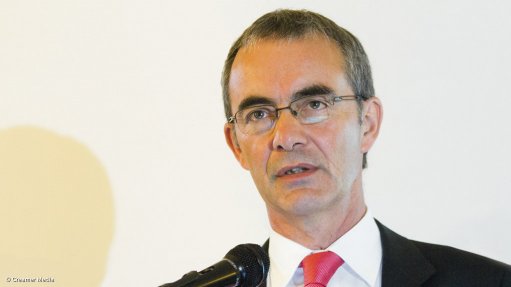
Chamber of Mines chief economist Henk Langenhoven
JOHANNESBURG (miningweekly.com) – Commissioned research by advisory firm Eunomix Research has led the South African Chamber of Mines (CoM) to reject the third iteration of the United Nations Conference on Trade and Development (Unctad) report on trade misinvoicing, which it dismisses as poor analysis based on incorrect analytical methodologies and incomplete data, according to CoM chief economist Henk Langehoven.
Eunomix Group CEO Claude Baissac noted in the Eunomix report that data-collection and commodity classification show critical discrepancies with the Unctad methodology. This reflects the findings in a CoM and Eunomix report published last year, which investigated the gold misinvoicing alleged by Unctad.
Baissac explains that the methodology used by Unctad to compare export and import data conflates routine, legal – albeit complex – trade invoicing and reporting with possibly illegal and illicit financial flows. This conflation undermines the accuracy of allegations that trade misinvoicing is being used to hide illicit financial flows.
Specifically, the cornerstone of the chamber’s rejection of the Unctad trade misinvoicing report’s conclusions is that "trade data discrepancies imperfectly reflect actual trade discrepancy, which may or may not indicate trade misinvoicing".
"When using South African trade data from various organisations and departments, including the departments of Trade and Industry and Mineral Resources, the South African Revenue Service (Sars), and the Reserve Bank, there is significant convergence in the reported volumes and values, and the same patterns can be recognised from the datasets," said Langenhoven.
Other international trade and finance organisations, including the World Bank, the International Monetary Fund and the Organisation for Economic Cooperation and Development, warned against the use of macro trade data as a basis for estimating illicit financial flows.
"There are no red flags raised and [there is] no reason to doubt the validity or quality of sales data provided by the predominantly listed large mining companies to the DMR, Sars and the Reserve Bank. The data from these companies are good and the statistical and regulatory authorities in South Africa are effective, but it is worrying that the Unctad reports were released without using these sources and authorities to benchmark the UN Commodity Trade Statistics (Comtrade) data used by Unctad to arrive at the conclusions that trade misinvoicing is hiding massive illicit financial flows."
The CoM could not let the inaccurate report lie, reiterated Langenhoven.
Eunomix highlighted in its first counterfactual report in December 2016 that the lack of rigour and unreliable methodologies used in the Unctad reports significantly impaired the accuracy of the conclusions and allegations made by the Unctad reports.
The CoM reiterated calls for Unctad to withdraw the report and acknowledge the shortcomings.